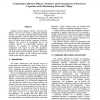Free Online Productivity Tools
i2Speak
i2Symbol
i2OCR
iTex2Img
iWeb2Print
iWeb2Shot
i2Type
iPdf2Split
iPdf2Merge
i2Bopomofo
i2Arabic
i2Style
i2Image
i2PDF
iLatex2Rtf
Sci2ools
HICSS
2003
IEEE
2003
IEEE
Community Collective Efficacy: Structure and Consequences of Perceived Capacities in the Blacksburg Electronic Village
Bandura’s social cognitive construct “perceived selfefficacy” has been used widely to understand individual behavior as a function of domain-specific beliefs about personal capacities. Collective efficacy is the extension of the self-efficacy construct to organizations and groups; it refers to beliefs about collective capacities in specific domains. Our research is investigating the use of collective efficacy in understanding attitudes and behaviors of members of proximal residential communities with respect to issues like attachment, engagement, and sociality, specifically as modulated by use of the Internet and community networks. This paper describes our analysis of the structure and external validity of the collective efficacy construct.
Biometrics | Collective Efficacy | Collective Efficacy Construct | HICSS 2003 | Social Cognitive Construct | System Sciences |
| Added | 04 Jul 2010 |
| Updated | 04 Jul 2010 |
| Type | Conference |
| Year | 2003 |
| Where | HICSS |
| Authors | John M. Carroll, Debbie Denise Reese |
Comments (0)

